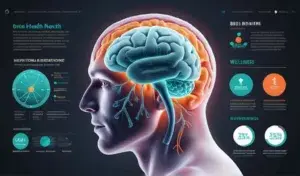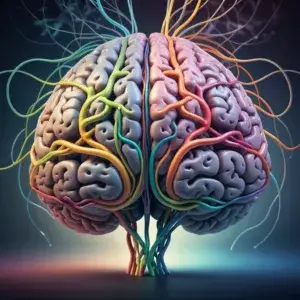Cognitive Behavioural Therapy (CBT): An In-Depth Guide
Table of Contents
Introduction to Cognitive Behavioural Therapy (CBT)
Talk therapy that explores the connections between our ideas, feelings, and behaviors is known as Cognitive Behavioural Therapy, or CBT. CBT helps people manage and overcome a variety of mental health issues by changing their thoughts and behaviours. The foundation of CBT is the belief that our thoughts shape our emotions and behaviors and that correcting negative thought patterns can improve our feelings and behaviours.
Psychiatrist Aaron Beck developed CBT in the 1960s, and it has since become one of the most commonly utilized and researched kinds of therapy. It works effectively in treating a variety of mental health disorders and is often regarded as the gold standard for psychological treatment.
What is CBT Effective For?
Cognitive Behavioural Therapy (CBT) addresses a variety of mental health issues. Some of the most common are:
Depression: CBT teaches patients how to identify and alter negative thought patterns that contribute to feelings of sadness and hopelessness.Anxiety Disorders: This category includes disorders such as Generalized Anxiety Disorder, Social Anxiety, and Panic Disorder. CBT helps individuals confront and reduce their fears.
Post-Traumatic Stress Disorder (PTSD): CBT can help people process and recover from traumatic events.
Obsessive-Compulsive Disorder (OCD): It aids in the management of compulsive behavior and obsessive thoughts.
Anorexia and Bulimia: CBT can help with eating disorders such as anorexia and bulimia by targeting food and body-image-related thoughts and behaviours.
Substance Abuse and Addiction: CBT enables people to understand and change the processes that contribute to substance use.
Insomnia: CBT is successful in treating sleep disorders by altering the thoughts and behaviors that interfere with sleep.
Chronic Pain Management: It helps people deal with long-term pain by changing how they perceive and respond to it.
CBT has a proven track record of success, with numerous studies demonstrating its effectiveness for a variety of conditions. It’s a practical, hands-on approach that focuses on solving problems and developing coping strategies.
How does Cognitive Behavioural Therapy work?
CBT is fundamentally about understanding the relationship between our thoughts, feelings, and behaviors. This is how it works.
1. Recognizing Negative Thought Patterns: The first stage in CBT is to identify the negative beliefs that cause emotional pain or harmful actions. These ideas are typically automatic and difficult to identify without guidance.
2. Challenging and Changing Thoughts: After identifying these thoughts, the next step is to challenge them. Are they based on facts, or are they manipulated in some way? CBT teaches you how to change negative beliefs into more balanced and realistic ones.
3. Changing Behaviors: CBT also focuses on changing behaviours that contribute to your problems. For example, if you avoid social events due to anxiety, cognitive behavioral therapy may involve gradually exposing yourself to these circumstances in order to reduce your fear.
4. Homework and Practice: One distinguishing feature of CBT is the emphasis on practice outside of therapeutic sessions. You will be given homework projects to reinforce what you’ve learned, such as keeping a thought diary or practicing relaxation techniques.
Working through these processes, CBT assists people in developing new skills and strategies for better managing their mental health.
Typical tools and techniques in Cognitive Behavioural Therapy
CBT uses a number of tools and approaches to help people modify their thoughts and behaviors. Here’s a list of some of the most popular ones:
- Cognitive Restructuring: This technique involves identifying and challenging cognitive distortions—unhelpful thinking patterns like black-and-white thinking or catastrophizing.
- Behavioral Activation: This strategy motivates you to do things that make you feel better, even if you don’t want to. It’s extremely effective for depression.
- Exposure treatment: For people with anxiety or phobias, exposure treatment entails gradually confronting their fears in a controlled and safe environment.
- Journaling: Recording your thoughts, feelings, and behaviors can help you see patterns and track progress.
- Mindfulness and Relaxation Techniques: Focusing on your breathing or physical sensations allows you to stay present and reduce stress.
- Goal Setting: CBT helps you strive toward positive change by using SMART (Specific, Measurable, Achievable, Relevant, Time-bound) goals.
- Problem-Solving Skills: Understanding how to break down problems into manageable steps and find solutions is an important aspect of CBT.
Find a Therapist
If you think CBT is a suitable fit for you, the next step is to identify a certified therapist. Here’s where you can start.
Online Directories: Websites like Psychology Today and BetterHelp contain directories of therapists who specialize in Cognitive Behavioural Therapy (CBT).
Referrals: Ask your doctor or another healthcare professional to refer you to a cognitive behavioural therapist.
Community Mental Health Centers: Many communities have mental health facilities that provide CBT, generally at a reduced rate.
Professional Organizations: The Association for Behavioral and Cognitive Therapies and other organizations frequently compile listings of qualified CBT therapists.
When selecting a therapist, think about whether you prefer in-person or online therapy and whether you want individual or group therapy sessions.
How to Choose the Right CBT Therapist.
Choosing the appropriate therapist is a crucial decision. Here are some things to consider:
Qualifications and Certifications: Ensure that the therapist is licensed and has had CBT-specific training.
Experience: Find out if the therapist has experience treating your specific condition.
Therapeutic Approach: Different therapists may have slightly different techniques, so it’s critical to locate one that meets your needs.
Communication style: You should feel comfortable talking to your therapist, and they should be someone you can trust.
Insurance and Cost: Determine whether the therapist accepts your insurance and whether their prices are within your budget.
Request information about their experience, approach, and work style during your initial meeting. It is critical to establish a rapport with your therapist, as this can have a significant impact on the success of your treatment.
When to Choose What: Therapist or Supplements
When coping with mental health concerns, you may ask whether you should see a therapist or take vitamins. Here’s how you decide:
When to See A Therapist:
Complex Mental Health Issues: If you suffer from severe depression, anxiety disorders, PTSD, or OCD, you should see a therapist. Customized to your individual requirements, CBT offers a systematic approach.
Behavioral and Cognitive Patterns: CBT is most effective for addressing issues with deeply rooted negative thought patterns or behaviors. A therapist can help you to challenge and change these patterns.
Therapists provide tailored support, assisting you in developing coping techniques and offering a safe space to express your thoughts and feelings.
Crisis Situations: In times of serious mental health crises, such as suicide ideation or severe panic attacks, prompt help by a therapist is required.
When To Use Supplements:
Mild to Moderate Symptoms: If your symptoms are mild, supplements like omega-3 fatty acids, St. John’s Wort, or GABA might help reduce anxiety, improve mood, and support brain health.
Although supplements can enhance cognitive function and reduce stress levels, they shouldn’t serve as the main treatment for serious illnesses.
Preventative Measures: Supplements can be used to maintain overall brain health, reduce stress, and avoid cognitive decline in people who do not have significant mental health disorders.
Cost and Accessibility: If therapy is prohibitively expensive or inaccessible, supplements may provide some relief, but they are not a substitute for expert care.
Combining Therapy With Supplements.
For many people, the best approach is to combine therapy with supplements. This combined approach can enhance the benefits of CBT by boosting brain function and mood with supplements, while CBT treats underlying psychological difficulties. It is critical that you discuss any supplements you are taking with your therapist or healthcare professional to ensure their safety and suitability for you.
Cognitive Behavioural Therapy is an effective method for treating a variety of mental health issues. CBT assists people in making major shifts in their lives by helping them understand the relationships between thoughts, feelings, and behaviors. Whether you have anxiety, depression, or simply want to improve your mental health, CBT can provide you with the techniques and tools you need to succeed.
If you’re considering CBT, take the time to find the perfect therapist for you, and don’t be afraid to incorporate supplements into your overall mental health approach. Remember that mental health is as important as physical health, and there are many tools to help you.
References and Further Reading
1. Beck, A. T. (1976), Cognitive Therapy and Emotional Disorders. New York: International Universities Press. A foundational text on cognitive therapy and its development.
2. Hofmann, S. G.; Asnaani, A.; Vonk, I. J.; Sawyer, A. T.; and Fang, A. (2012). The Efficacy of Cognitive Behavioral Therapy: A Review of Meta-Analyses. Cognitive Therapy and Research, 36(5), 427–440.
– A comprehensive review of the effectiveness of CBT across various mental health conditions.
3. Butler, A.C., Chapman, J.E., Forman, E.M., and Beck, A.T. (2006). The empirical status of cognitive-behavioral therapy: A review of meta-analyses. Clinical Psychology Review, 26(1), 17–31.
A review of meta-analyses evaluating the effectiveness of CBT.
4. Kazantzis, N., Whittington, C., & Dattilio, F. M. (2010). A meta-analysis of homework effects in cognitive and behavioral therapy: replication and extension. Clinical Psychology: Science and Practice, 17(2), 144–156.
Discusses the role of homework assignments in CBT effectiveness.
5. National Institute for Health and Care Excellence (NICE). (2021). Adult Depression: Treatment and Management. NICE Guidelines The text provides guidelines on the treatment of depression, including the use of CBT.
6. American Psychological Association (2023). Understanding Cognitive Behavior Therapy. APA Site
Offers a detailed explanation of CBT and its applications.
Support Networks and Resources
- BetterHelp : An online platform that connects people to licensed therapists for CBT and other types of therapy.
- Association for Behavioral and Cognitive Therapies (ABCT) is a professional association dedicated to the growth of cognitive behavioral therapy (CBT), with tools for choosing a therapist.
- Mental Health America : Offers mental health information and resources, as well as a support service locator.
- National Alliance on Mental Illness (NAMI) : The organization provides support, education, and advocacy for those with mental illnesses.








